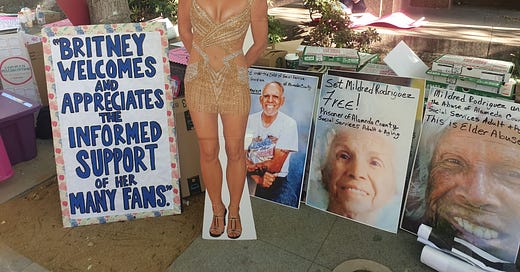DADDY ISSUES
How #FreeBritney went from unhinged celeb conspiracy theory to grassroots social justice movement
Sorry for going MIA last week, I have been dancing on the edge of a pretty dark void with details forthcoming in a future newsletter post, obvi. Now I’m crawling back to you, frail and hungover, with one of the most bizarre (and ultimately heartwarming!) protests I’ve ever witnessed—a weird Hollywood scene that, to me, perfectly encapsulates the strange collision of pop culture, conspiracy theories, and social justice that this surreal year has wrought. Enjoy~~~
“Wake up,” I’m shaking the dope fiend out of his stupor as the midday sun pokes through my bedroom’s blinds. We must have dozed off at some point during our multi-day rager, which began in the heat of post-election euphoria and has since spiraled into a devilish abyss. Now I’m waking up to a barrage of DMs from a friend in New York: GORL!!! PLEASE GO TO THIS FOR ME OMG!!! Squinting out of one bleary eye, I click the link my friend has sent me, and realize that something strange is going down not too far from my house in Hollywood.
“Get up,” I shake the dope fiend a little harder. “Uh—do you want to go to the Britney Spears protest?”
In the past year, #FreeBritney has grown from an unhinged celebrity conspiracy theory to become a grassroots social justice movement reshaping the ways we relate to superstars, disability rights, and mental health. The seeds of this sprawling movement, which has sparked protests all over the world, were planted back in 2008, when Britney had her infamous bald head meltdown—as you probably recall in stark detail, she shaved her hair off in front of more than seventy paparazzi, attacked a pap’s car with an umbrella, and finally got strapped to a gurney and whisked to a mental hospital for the first of two involuntary 5150 psychiatric holds.
Ever since, Britney has been placed in a legal guardianship, also known as a “conservatorship” in California, which means that one of the world’s most successful pop stars can hardly take a shit without having to ask permission from her dad Jamie Spears—who monitors her every move, collects a $16,000-a-month salary, and is also in charge of her multi-million-dollar estate.
Then, in 2019, Britney cancelled her Vegas residency and disappeared from the public eye. This is when her story takes a darker, conspiratorial turn: in April, an anonymous whistleblower left a voicemail for a popular Britney Spears podcast, alleging that Britney was forcibly medicated and committed against her will to a mental hospital for a much longer period than her team had disclosed. The hashtag #FreeBritney went viral, as fans dissected her Instagram posts for signs that their idol was being held captive by an abusive legal system and secretly begging for her freedom. Their suspicions were further validated when Britney submitted a petition to remove her dad from the conservatorship position this year, and as a legal battle unfolded in a courthouse in LA, fans all over the world took the fight out of internet forums and into the streets, staging #FreeBritney protests in solidarity with their queen.
Many other journalists have spent way more time excavating the details of this convoluted saga, and I highly recommend reading Rex Weiner’s reporting on how conservatorship abuse is contributing to gentrification and homelessness—which makes a good case for why America’s current legal system for safeguarding society’s most vulnerable members is in desperate need for reform.
I’ve become seduced by this story because of its unexpected intersection with the political themes I’ve been chasing since earlier this summer: the fight for both individual and collective autonomy from the systemic abuse of power. #FreeBritney also reinforces how protesting has become a dominant form of pop culture, while revealing how much the public’s perceptions of mental health issues and celebrity “authenticity” has shifted in the past decade: a mental breakdown that was previously mocked and ridiculed as tabloid fodder is now being held up as a mirror, reflecting our own deeply unhealthy relationship to female auteurship and agency. In other words, Britney’s daddy issues are the twisted real-world consequences of us collectively trapping an adult woman in the hellish limbo of being a perpetual Lolita doll-child. According to her fans, her fight for legal emancipation is also a broader referendum on the capacity for victims of abuse to reclaim their agency.
Not gonna lie, the conspiratorial underbelly of this movement also intrigued me: many #FreeBritney fans believe Britney is communicating with them secretly through symbols and hidden messages on her Instagram posts, such as a red rose emoji that she frequently sprinkles in her captions (bless our socialist queen?). Others think she’s not really in control of her social media, or has been replaced by a body double. Some even think she’s spelled out “Call 911” on her eyelashes.
The rise of QAnon has been one of the most baffling cultural developments I’ve ever witnessed, and my brain starts to crack whenever I try to understand how this loony internet cult became so mainstream. While its worldview is far less sinister, #FreeBritney seemed to offer an alternate way to access the conspiratorial mindset that fuels teenage girls and boys in suburbia to pore over extremely boring legal documents in granular detail, and even host tutorials on Instagram to explain all the legal jargon.
So as the dope fiend and I sped down the highway to the #FreeBritney rally, adrenal glands thrumming, I had two questions running through my head: what do #FreeBritney fans have in common with QAnon followers? And why the hell are #FreeBritney protests also aligning themselves with social justice and Black Lives Matter?
This is an excerpt of a story that will be sent to paid subscribers—to read the full post and gain access to future sub-only stories, smash that subscribe button above <3





Why I have not heard about this until now